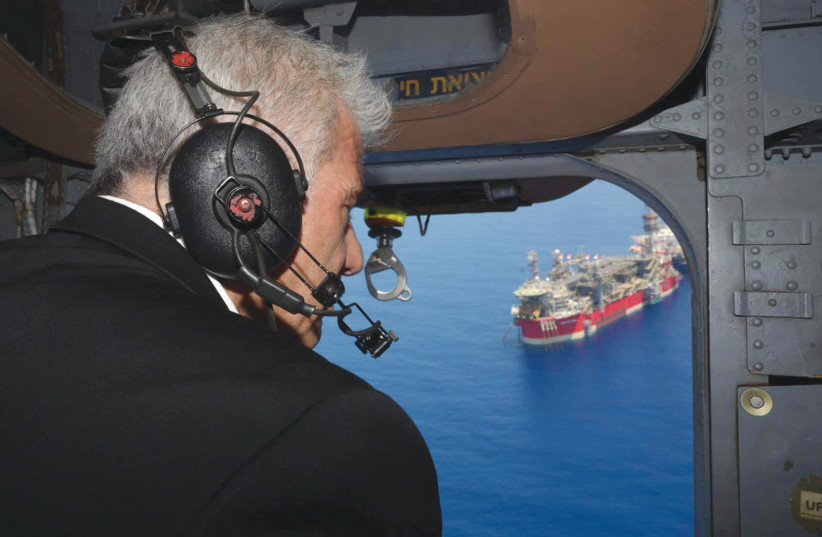Hamas warned the Palestinian Authority against handling the issue of natural gas fields located off the coast of the Gaza Strip on Thursday, just days after PA Prime Minister Mohammed Shtayyeh announced that a team would be formed to conclude an agreement with Egypt concerning the gas.
The development of the fields has been held up for over two decades due to disputes with Israel and economic difficulties, including disputes surrounding an agreement granting Israel surplus gas from the field. The Gaza Strip is under an Israeli maritime blockade which restricts Gazans from going more than at most 12 nautical miles from the coast.
"All previous experiences have proven the inability of the Palestinian Authority to manage the wealth of our Palestinian people," said Hamas to Al-Watan news. "The Authority is not qualified to receive the gas file, as it is involved in cases of corruption, waste of money and misconduct."
Shtayyeh stated on Monday that Mohammad Mustafa, the chairman of the Palestine Investment Fund (PIF), and his team, which includes a number of ministers, were conducting negotiations with Egypt in order to develop the gas fields off the coast of Gaza.
In recent days, foreign media reported that Israel, Egypt and the Palestinian Authority were holding discussions to begin pumping gas from the gas fields located off the coast of Gaza. Some of the reports have claimed that Israel would receive part of the profits generated from the gas fields.

Transfer of ownership
In 2000, the British Gas (BG) group discovered the Marine 1 and Marine 2 gas fields about 35 kilometers off the coast of Gaza after being granted an exploration license by the Palestinian National Authority. After Shell acquired BG in 2016, CC Oil & Gas and the Palestinian Investment Fund (PIF) acquired Shell's working interest in the fields, with each party owning 50%.
According to CC Oil & Gas, the fields are estimated to contain over 1 trillion cubic feet of gas, similar to the size of the Karish gas field.
In February 2021, the Palestinian Authority signed a memorandum of understanding with the Egyptian Natural Gas Holding Company (EGAS) to cooperate on efforts to develop the gas fields off the coast of Gaza.
An Egyptian source told AFP on Friday that Egypt has been "in contact with all parties, including Israel, to develop and profit from Gaza's gas reserves, which would also support the Palestinian economy." The talks include the Palestinian Engineering firm Consolidated Contractors Company, the PIF, EGAS and Israel, according to AFP.
Reuters also reported that EGAS was holding negotiations with Palestinian authorities to develop the offshore field and was seeking a green light from Israel for the project.
A senior PA official told AFP that after an agreement is signed, EGAS will begin developing the Marine gas fields with the goal of starting production within two years.
An official in the Egyptian intelligence service told Al-Monitor on that an Egyptian economic and security delegation has succeeded in reaching "a compromise that would benefit all relevant parties, the most important of which are Israel and the PA." One of the conditions Israel insisted on is the start of practical measures to extract gas from the fields at the beginning of 2024 for security reasons, according to Al-Monitor.
A member of the PLO Executive Committee told Al-Monitor that the gas development would be supervised by Egypt and Israel and that part of the gas will be exported to Egypt while the rest will be exported to Europe, with the revenues returning to the treasury of the PA. Part of the revenue will be used to support Gaza's economy.
Globes reported on Thursday that Energy Minister Karin Elharar had confirmed that Israel had been contacted about reaching an agreement concerning the gas fields off the coast of Gaza, but added that the matter should wait until after the upcoming Knesset elections.
Despite the reports, a Palestinian source has denied that Israel was involved in negotiations about the gas fields, the Turkish Anadolu Agency reported on Thursday. "The talks don't include Israel. We will not pay Israel to extract our gas. This is unacceptable," said the source.
Earlier this week, Hamas official Suhail al-Hindi told the Palestinian Quds news that the movement would not allow Israel or anyone else to benefit from resources that belong to the Palestinian people. "We cannot allow anyone to control these wealth, whether the occupation or others, and to enjoy them at the expense of our people," said Hindi.
The reports on attempts to reach an agreement concerning the Gaza Marine gas fields come just weeks after Lebanon and Israel announced that they had reached understandings concerning the demarcation of their shared maritime border, opening up the door for Lebanon to begin gas exploration in the Kana gas field.
Hamas demands end to maritime blockade
In May, Hamas's leader in the Gaza Strip, Yahya Sinwar, claimed that Hamas was working with other parties to operate a maritime line to the Strip in order to bypass the Israeli blockade on the coastal enclave.
Sinwar added that consultations and preparations on this issue are "in full swing" in order to "break the siege completely," but did not elaborate on how such a line would get past the Israeli blockade.
Since then, Hamas and other Palestinian factions have held events on the Gazan coast calling for an end to the maritime blockade.
